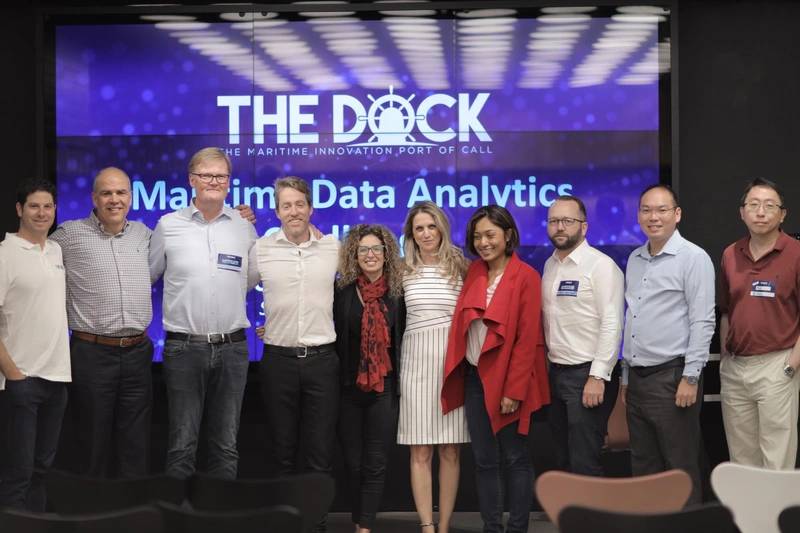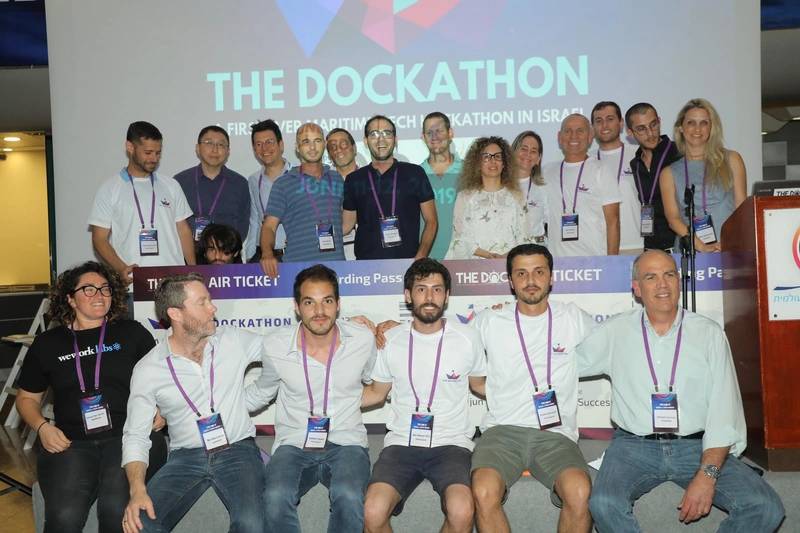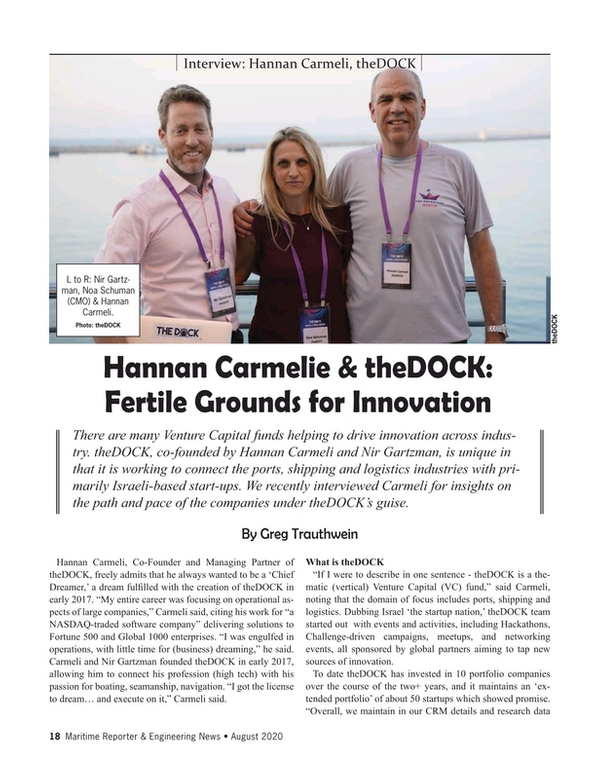
Interview: Hannan Carmeli & theDOCK: Fertile Grounds for Innovation
There are many Venture Capital funds helping to drive innovation across industry. theDOCK, co-founded by Hannan Carmeli and Nir Gartzman, is unique in that it is working to connect the ports, shipping and logistics industries with primarily Israeli-based start-ups. We recently interviewed Carmeli for insights on the path and pace of the companies under theDOCK’s guise.
Hannan Carmeli, Co-Founder and Managing Partner of theDOCK, freely admits that he always wanted to be a ‘Chief Dreamer,’ a dream fulfilled with the creation of theDOCK in early 2017. “My entire career was focusing on operational aspects of large companies,” Carmeli said, citing his work for “a NASDAQ-traded software company” delivering solutions to Fortune 500 and Global 1000 enterprises. “I was engulfed in operations, with little time for (business) dreaming,” he said. Carmeli and Nir Gartzman founded theDOCK in early 2017, allowing him to connect his profession (high tech) with his passion for boating, seamanship, navigation. “I got the license to dream… and execute on it,” Carmeli said.
What is theDOCK
“If I were to describe in one sentence - theDOCK is a thematic (vertical) Venture Capital (VC) fund,” said Carmeli, noting that the domain of focus includes ports, shipping and logistics. Dubbing Israel ‘the startup nation,’ theDOCK team started out with events and activities, including Hackathons, Challenge-driven campaigns, meetups, and networking events, all sponsored by global partners aiming to tap new sources of innovation.
To date theDOCK has invested in 10 portfolio companies over the course of the two+ years, and it maintains an ‘extended portfolio’ of about 50 startups which showed promise. “Overall, we maintain in our CRM details and research data of some 300 startups to-date,” said Carmeli, with about 70% Israel-based and the remainder from around the world.
To facilitate meaningful tech innovation, theDOCK has relations with about 100 “major players,” including global terminal operators, port authorities, shipping companies, class societies, equipment manufacturers and shipyards, among others. “Of these, some 40 companies have sent representatives to various events and panels organized by us in Israel throughout the last three years. With eight of them we signed formal strategic relations,” said Carmeli. The growth to date has been palpable. “When we first mapped the number of Israeli startups which had any potential strategic play with ports, shipping and logistics back in 2017 - the number was 37. Today we count 105,” said Carmeli. theDOCK is always on the prowl for innovators, and in this regard Carmeli said that “for a startup to be interesting for us it has to fulfill three main criteria:”
1. Address a recognized market pain point. We are driven by challenges which are intimated with us by our global partners (leaders in the space).
2. Own deep technology. i.e. - have significant Intellectual Property (IP). It could be in any of the interesting and “hot” disciplines such as AI and Learning, Augmented Reality, underwater communication, energy and charging, etc.
3. Present a strong, coherent and committed team with good coverage of technology and business knowledge/expertise.
 Photo: theDOCK
Photo: theDOCK
Maritime Opportunities Abound
While the maritime sectors generally have been conservative on the uptake of new technologies, Carmeli sees this as a positive, as the maritime, port and logistics sectors will have to innovate to keep up with developments in related sector, making it ripe for innovation leaps. “Back in 2017 when we started looking into it, we observed early indicators for change,” said Carmeli. First, “leaders in the space started nominating executives to new roles which did not exist up until then: CDO (Chief Digital Officer), VP Innovation etc. Maersk, Wartsila, PSA, Cargotec were a few such leaders, and indeed very quickly we connected and identified joint vision regarding innovation in the space. Also, we recall an interview by Soren Skou – Maersk’s CEO, in which when asked about who does he foresee as his competition in the future he provided a surprising answer (back then). it was not any of Maersk traditional competitors, rather he cited Amazon. This was a clear sign that things were going to change in the space.”
While theDOCK is still in its infancy, it has already experienced success.
• Orca / Liberty – Pilot benefitting both organizations around intelligent bridge assistance and fleet management.
• DockTech / Kirby – Pilot addressing depth mapping of segments of the Mississippi river in order to optimize barge load while maintaining safety measures.
• ArcusTeam – theDOCK led an investment round by syndicating additional funding (1+ USD million) on top of our own investment.
• AIDock – theDOCK’s network of mentor yielded an opportunity for one of its mentors to assume the role of COO with a portfolio company, benefitting both sides.
Partnership with leaders in the maritime space – Lloyd’s Register, ThyssenKrupp, Wartsila, and Maersk, to name a few, is a vital component of the success of start-ups under via theDOCK. “We usually sign one-year cooperation agreement which is framed as follows,” said Carmeli. “We first conduct a few sessions to understand the needs and challenges our partner would like to address. We then draft together a high-level annual plan (how many campaigns, KPIs for the number of startups and pilots to be identified etc.). Next step is carrying out the plan and delivering on the results.” The approach has the potential to benefit both sides, as theDOCK partners get an exciting deal flow of startups addressing the business/operational needs specified; while startups get access to data, knowledge and platform/equipment for running pilot programs.
While progress to date has been substantial, theDOCK team continues to eye the impact of the COVID-19 pandemic, both in the near and long-term.
“The pandemic is a game changer,” said Carmeli. “No man-made event could have ever inflicted such impact on our personal and business lives. The changes forced us to open our eyes to many new facts and observations. We can use zoom instead of travel. We may reduce office visits by using electronic bill of lading rather than get (in person) stamps on a piece of paper. These are just two examples of habits that changed (or accelerated) due to Covid19 and which might actually stick. That’s the upside.”
But there is a flipside, too. “On the other hand, business slowed down. With a few early stage startups struggling due to freeze of funding and pilots, for example. Young companies have all taken yet another look at their burn rate in order to increase the runway left before they get to the next round. The strong will survive as their market will look for efficiency, new offerings and optimized operations. These are fertile grounds for innovation.” Photo: theDOCK
Photo: theDOCK
Read Interview: Hannan Carmeli & theDOCK: Fertile Grounds for Innovation in Pdf, Flash or Html5 edition of August 2020 Maritime Reporter
Other stories from August 2020 issue
Content
- Training Tips for Ships #15: Using Student Exam Results to Measure OUR Performance page: 12
- Container Losses in the Rolling Seas page: 14
- Project Cargo and Heavy Lifts in the COVID-19 Environment page: 16
- Interview: Hannan Carmeli & theDOCK: Fertile Grounds for Innovation page: 18
- Interview: Tracy Zea, President & CEO, Waterways Council Inc. page: 22
- Shipping through the Pandemic: Perfect Storm or Wake up Call? page: 24
- Interview: Lasse Petterson, CEO and President, Great Lakes Dredge & Dock page: 36
- In the Shipyard: The Art of the Ship Lift page: 42
- Interview: Heavy Lifting with John DiMartino and Tandemloc page: 46
- Engineering Heavy Lifts: “Clear the Flight Deck” page: 50
- Shipping Community Beware; Sanctions Scrutiny is Stepping up a Gear page: 56


